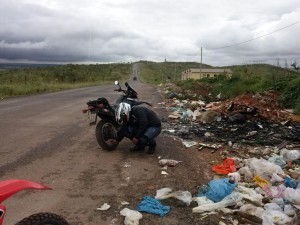
An often overlooked area of prepping is post-SHTF disease control and field sanitation. A huge priority after the SHTF, above practically everything else, should be maintaining an optimum level of general health including hygiene. Extreme attention to staying healthy must not only be a priority for you, but for everyone around you. If a member of your group becomes stricken with a disease in the days following an event, the implications could be disastrous. Your loved ones will look for help from the people who have been telling them the collapse is coming. As it is that you are reading this article, that person will most likely be you.
The days of the outhouse have long been forgotten. In an advanced country such as ours, the thought of what can kill you in an unsanitary environment rarely enters the mind of the average American. Most people have no idea what happens to human waste or how it is ultimately disposed of. The modern sewer system and treatment facilities we utilize have gone a long way towards the advancement and well being of our society. Even more reassuring are the advertisements of the 1930’s touting toilet paper that is now, “Splinter-Free!” A shining example of how far our civilization has come.
Now imagine that we power it all down! Off goes the bar screens, the grit
pathogens such as bacteria, viruses, mold spores and protozoan are leaked into the environment. Pathogens that had been relegated to third world areas are now airborne and people are starting to get sick with no infrastructure to help them get better. Though many of us prepare for armed bandits or thieves, we must always remember that the invisible invaders can be the deadliest.
Living Areas
Make absolutely sure that everyone in your group is informed and contained. If you are in an area where sewage has backed up, move away or decontaminate (if you have the proper equipment). It will be necessary for adults to be mindful of what kids are getting into. Only give them toys that can be cleaned easily with bleach. Dig a latrine six feet deep and away from water sources. Make sure the new commode area is as far away from your living area as possible. An ounce of prevention is worth a pound of cure in this case.
Know the symptoms
Prevention may not always be possible and with the recent influx of aliens entering the US, we may become all too familiar with diseases born of third world environments. Common infectious diseases associated with unsanitary conditions are: Cholera, Cryptosporidiosis, Hepatitis, Meningitis, Rota-virus, Tuberculosis, and Typhoid just to name a few. Almost all of these illnesses include fever and symptoms that lead to dehydration. Immediately the afflicted will need lots of clean water, antibiotics and a fever reducer like aspirin. Needless to say this will put a strain on the precious items you have stored.
Essential Supplies
After water and food, it might be a good idea to store bleach or chlorine for disinfecting. Assuming that while cleaning you are exposed, rubber gloves and N95 surgical masks are a must have. N95 masks are necessary for filtration of airborne diseases such as TB and the flu. Alternative medications such as colloidal silver and echinacea could be a lifesaver for bacterial and viral infections. A stock and regimen of high quality vitamins and minerals will help to stave off most illnesses. If ingested at early onset of an illness, high grade vitamin C can greatly boost your immune system if taken in sufficient quantities.
During times of crisis the average person has no idea what to do. Those in your group will need to chip in and help in some way. At the very minimum, make sure they know how to sanitize and stay healthy. Learn about the invisible invaders, then teach what you have learned and the life you save, may be your own.
Source:Shtfjournal.com
Leave a Reply